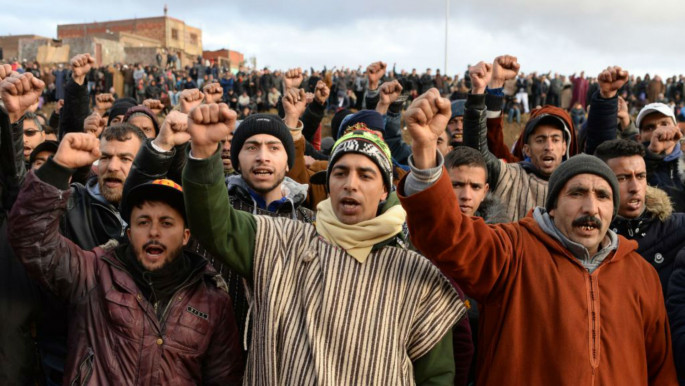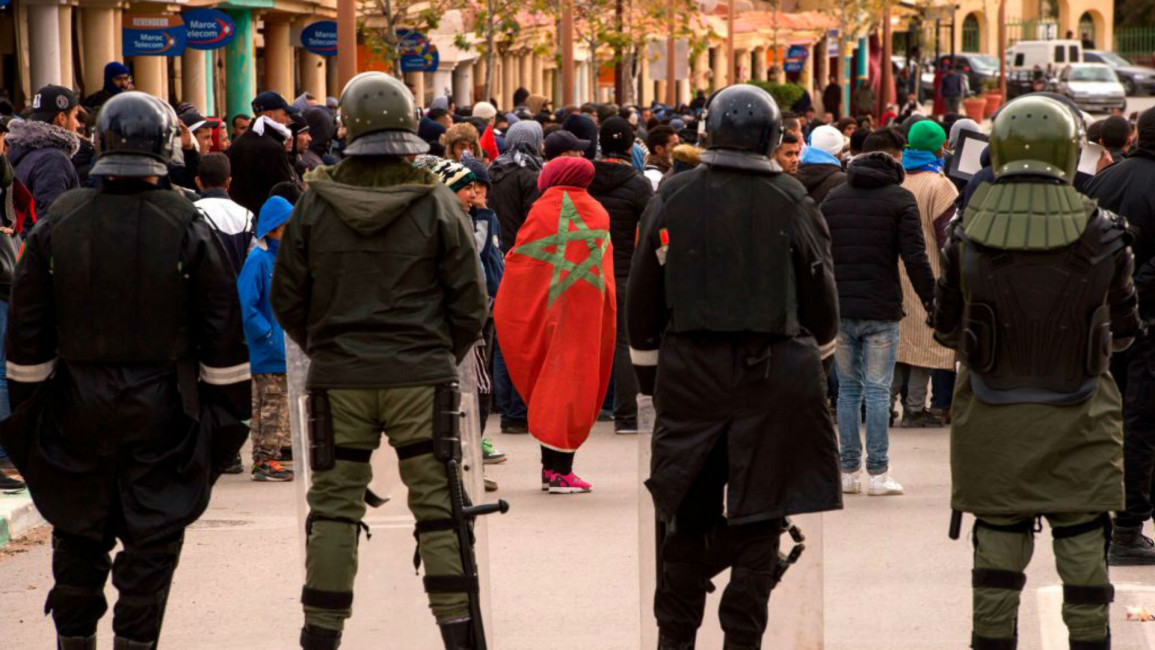
So long to freedom of expression in Morocco
The official rhetoric, copiously relayed by the local press, certain international media and above all by a considerable share of public opinion, claims that Morocco dealt skillfully with the 2011 challenge.
While the country was still in the throes of the 20 February Movement, King Mohamed VI announced extensive political reforms on 9 March, less than three weeks after the first street protests.
In July, a new constitution, which gave the government greater executive powers (conceded from the king), was approved by 98 percent of the electorate. And in November, an early parliamentary election brought an Islamist formation which had never held office - the Justice and Development Party (PJD) - to the government.
Despite these concessions, for nearly a year, the 20 February Movement pursued its street protests at a steady pace and there were intense political debates, even in the outlying regions. A hard-fought battle for freedom of speech was gradually being won, and many social movements have since profited from it.
And yet, seven years on, activists who have taken part in this protest movement - unprecedented in the recent history of the country - are worried. Their achievements are a far cry from the "Moroccan exception" vaunted by the government.
'In comparison to 2011, we feel stifled'
"2011 was a moment of freedom! We feel stifled in comparison with 2011. We feel constantly watched, we feel a lot of pressure" says Khadija Ryadi, 2013 recipient of the UN Human Rights Prize and former president of the Moroccan Association for Human Rights (AMDH). "We haven't seen anything like this in years," she says.
The country is currently suffering an especially violent wave of repression, cancelling out the recent advances in freedom of expression and the right to gather together.
International NGOs confirm this is happening. Last winter, Amnesty International denounced instances of torture - denied by the authorities - inflicted on members of Hirak, the activist movement which arose in the Rif in October 2016, demanding social and economic reforms.
More recently, Human Rights Watch (HRW) has pointed the finger at police violence and an oppressive atmosphere hindering its investigations in Jerada, a former mining town wracked by street protests.
 |
In recent years, all independent newspapers have vanished from the news-stands while the rare reporters who dare to challenge the prevailing taboos are subjected to increasingly heavy pressure |  |
Moreover, in the World Press Freedom Index for 2018 compiled by Reporters Without Borders, Morrocco ranks 135th, proof of the crisis affecting journalism in the country.
In recent years, all independent newspapers have vanished from the news-stands while the rare reporters who dare to challenge the prevailing taboos are subjected to increasingly heavy pressure. For having covered the Rif demonstrations, seven people, mostly ordinary citizens who reported the first protests, are presently behind bars along with some of the movement's activists.
A thousand political prisoners in one year
The figures published by the AMDH are perfectly clear. Nearly one thousand people have been detained in the past year for political reasons. This is on a scale unseen in the country since 2003 and the wave of arrests following the Casablanca terrorist attacks, according to Youssef Raissouni, administrative director of the AMDH.
[Editor's note: A series of suicide bombings on 16 May 2003, carried out by some ten men from the Sidi Mounen shantytown, killed 41 and wounded around a hundred others. It was described as "Morroco's 9/11" and triggered a political crisis and a major security crackdown.
Officials fear unrest could lead to a return of security threats to the state.]
 |
|
| Moroccans defy a government ban on protests in the town of Jerada in March 2018 [AFP] |
Among the prisoners held in recent months there are demonstrators from the Hirak movement, others from Jerada, students from the National Union of Moroccan Students (UNEM), various people who have taken part in the social movements across the country, and some journalists.
About 800 people have been prosecuted in connection with Hirak, according to Rachid Belaali of the prisoners' defence committee.
In Jerada, where the population swarmed through the streets from December to March following the deaths of two miners, some 100 people are now in jail after a demonstration was put down in March, according to the Oujda branch of the AMDH.
The arrests go on and on, but so do the releases, which makes it hard to keep track of the numbers, according to Jawad Tlemsni from the AMDH office in Oujda, where the trials are being held. By his count, another 20 people have been jailed in the past few days.
Meanwhile, in Casablanca, the marathon trial hearings of Hirak's leaders continue unabated. And in El-Hoceima, where Hirak began, demonstrators are receiving heavy prison sentences every day and are facing widespread indifference.
In May, to mark the first anniversary of the beginning of the crackdown, the Hirak inmates at Oukacha prison in Casablanca - among them Nasser Zefzafi, a well-known activist from the Rif - began a hunger strike to protest against their detention conditions.
On Wednesday 6 June, Zefzafi began his second year in isolation, in total disregard for UN norms, as HRW has pointed out.
Activists and trade unionists targeted
In this context, the work of human rights activists based in Morocco has become especially difficult. Raissouni, who has been active in the protest movement since 2011, makes no bones about it: "I have much less freedom than I had in 2011."
Every day he runs into a ban on some activity as well as financial restrictions. "We can't work the way we used to, engage in advocacy, set up training programmes, organise public actions. We no longer have any room to act," he explains.
 |
I have much less freedom than I had in 2011... We are not living under the rule of law |  |
"We are not living under the rule of law. Our constitution is not democratic, despite a few improvements in the wording. The Makhzen [central power] is clever. Nothing is ever formalised and hence any progress is reversible," he adds.
Following a period of intense militancy and a renewed interest in politics among young people, after 2013 there was a gradual decline, once the 20 February Movement began to weaken. The following year, the authorities delivered an unequivocal message with a speech in parliament by the then-minister of home affairs, Mohamad Hassad.
Raising the spectre of terrorism, he claimed that certain associations had an agenda dictated from abroad. "Pretending to be working in favour of human rights", they might be a danger to national security. Since then, NGOs, but also trade unions have had difficulties organising public events, hiring halls and obtaining the official documents legalising their existence.
A sharp decline in freedoms
Over the past four years, 140 events organised by the AMDH have been banned, according to Raissouni. The association has about 100 sections and 60 of these, including their offices in Rabat, Casablanca, Marrakesh, Tangiers, Kenitra and Sale have not even been able to obtain a registration certificate when filing documents that they must legally provide.
In Oujda, where the board members were reappointed last March, the local authorities have refused to register the changes, Jawad Tlemsani says. A former member of the UNEM, 26-year-old Tlemsani, belongs to the Unified Socialist Party and has witnessed the birth of a genuine culture of protest over the past few years.
But despite this undeniable progress, he denounces a sharp decline in liberties. From his vantage point in Oujda he has seen mobilisation dwindle and fear develop among the population of Jerada, where two more miners died at the beginning of June.
Street protests have become few and far between. Only an occasional sit-in, often declared on the spur of the moment, will occur in a limited number of neighbourhoods.
While this confrontation with the authorities goes on, Khadija Ryadi looks to the past. This crisis is so unprecedented and so profound that she and other activists find themselves regretting getting their hopes up following the progress made in the 1990s and the lure of the democratic overtures initiated towards the end of the reign of Hassan II.
"The '90s were the best time. In 2011, it was different, it was very short. In the '90s there was real freedom of speech," she maintains. "From 1992 to 2001 was the only time there was investigative journalism, freedom of association. Public space was expanded, there were real political debates. Nowadays, if anybody says a word, if the press opens a debate, people go to jail. There are no more debates, everything is locked down."
Ilhem Rachidi is a journalist working for French-speaking (Mediapart, Rue89) and English-speaking (The Christian Science Monitor, Toward Freedom, Al-Monitor) newspapers. She has written extensively on protest movements and human rights.
Follow her on Twitter: @Ilhemrachidi
Opinions expressed in this article remain those of the author and do not necessarily represent those of The New Arab, its editorial board or staff.



